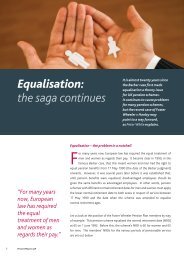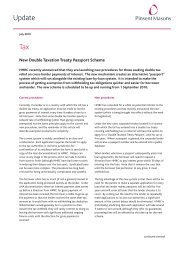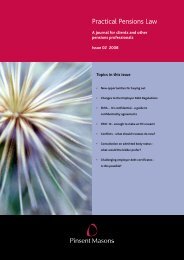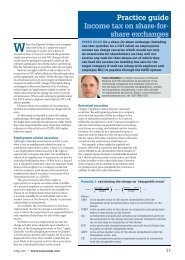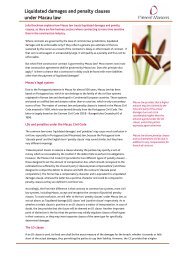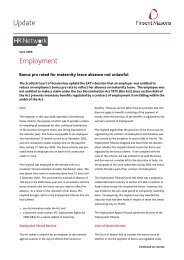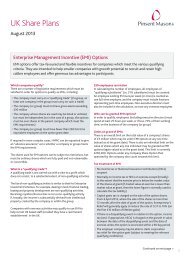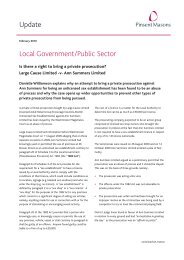Insolvency and Health Special Administration - Pinsent Masons
Insolvency and Health Special Administration - Pinsent Masons
Insolvency and Health Special Administration - Pinsent Masons
Create successful ePaper yourself
Turn your PDF publications into a flip-book with our unique Google optimized e-Paper software.
<strong>Health</strong> <strong>and</strong> Social Care Bill 2011<br />
<strong>Insolvency</strong> <strong>and</strong> <strong>Health</strong> <strong>Special</strong> <strong>Administration</strong> –<br />
Failure in the NHS<br />
Introduction<br />
The <strong>Health</strong> <strong>and</strong> Social Care Bill introduces substantial changes to<br />
the way that failing entities within the NHS will be dealt with.<br />
A new <strong>Health</strong> <strong>Special</strong> <strong>Administration</strong> regime is introduced,<br />
which is similar to the special regimes that are in place for<br />
other essential public services. All other entities are subject<br />
to normal insolvency law.<br />
Directors will therefore need to be aware of which regime<br />
applies to their organisation.<br />
<strong>Health</strong> <strong>Special</strong> <strong>Administration</strong><br />
The introduction of the <strong>Health</strong> <strong>Special</strong> <strong>Administration</strong> regime<br />
is designed to ensure that certain "Designated Services" are<br />
protected. Whether a service is "Designated" will be<br />
determined by Monitor on the basis of how essential they are.<br />
The regime is similar to those in place in the rail, energy,<br />
banking <strong>and</strong> public private partnership sectors where<br />
continuity of service is of particular public interest. <strong>Special</strong><br />
administration regimes are rarely used. A high profile example<br />
was in 2001 when the then Secretary of State for Transport,<br />
Stephen Byers, petitioned the courts to place Railtrack Plc into<br />
"railway administration".<br />
If a supplier of designated services was deemed to be failing,<br />
Monitor will have the ability to seek an order from the court<br />
for that entity to be placed into <strong>Health</strong> <strong>Special</strong> <strong>Administration</strong>.<br />
The <strong>Health</strong> <strong>Special</strong> Administrator will have specific statutory<br />
objectives (primarily to ensure the continuity of the provision<br />
of the Designated Services). This could be achieved by either<br />
rescuing the entity as a going concern or transferring<br />
designated services to an alternative provider.<br />
Whilst doing this the <strong>Health</strong> <strong>Special</strong> Administrator will also<br />
have to ensure that the entity continues to comply with the<br />
requirements of the Care Quality Commission.<br />
The <strong>Health</strong> <strong>Special</strong> Administrator will also have a duty to<br />
protect the interest of creditors as a whole. It may prove<br />
difficult for the <strong>Health</strong> <strong>Special</strong> Administrator to ensure<br />
continuity of service whilst protecting the interests of<br />
creditors as a whole. Ensuring continuity of service may<br />
require additional funding or borrowing whilst suppliers are<br />
sourced for continuing services. Normally an administrator<br />
requires good reason to borrow <strong>and</strong> would only do so where it<br />
would be for the benefit of the creditors as a whole. The<br />
<strong>Health</strong> <strong>Special</strong> Administrator will have to decide which of<br />
these duties prevails.<br />
Non-Designated Services<br />
All other entities that provide services to the NHS would be<br />
subject to normal insolvency law, whether they are an NHS<br />
body or a non-private company or entity.<br />
Normal insolvency processes include company voluntary<br />
arrangements, administration, liquidation <strong>and</strong> schemes of<br />
arrangement.<br />
The explanatory notes to the <strong>Health</strong> <strong>and</strong> Social Care Bill<br />
explain that it will only be appropriate to deal with the failure<br />
of NHS Foundation Trust using normal insolvency law where<br />
that foundation trust is providing wholly non-designated<br />
services.<br />
Also raises a number of grey areas for providers. It is not clear<br />
when or which services will be deemed to be Designated<br />
Services. It is therefore unclear to the NHS, directors, <strong>and</strong><br />
creditors which insolvency procedure will be applicable to a<br />
particular entity. This could result in uncertainty where a<br />
supplier is of doubtful solvency <strong>and</strong> could lead to creditors<br />
being unnecessarily reluctant to supply to it.<br />
Monitor will have the ability to step in where a trade creditor<br />
takes action against the provider (for example issues a<br />
winding-up petition) <strong>and</strong> to apply for a <strong>Special</strong> <strong>Health</strong><br />
<strong>Administration</strong> Order. Again, this leaves the petitioning<br />
creditor in a difficult position as it will not know whether<br />
there is any merit in issuing a winding-up petition <strong>and</strong><br />
incurring the cost of doing so.<br />
Considerations for Directors<br />
Directors of Service Providers to the NHS will need to be<br />
aware of their duties in both solvent <strong>and</strong> insolvent situations.<br />
Where a company is insolvent its directors' overriding duty is<br />
to act in the best interest of the creditors of the organisation.<br />
If the company is a Designated Service Provider, this duty has<br />
to be balanced against ensuring the confirmed provision of<br />
Designated Services. In this situation, providers should seek<br />
legal advice <strong>and</strong> engage Monitor to establish at an early stage,<br />
whether they are a provider of Designated Services.<br />
continued on reverse
However, if those directors are directors of an organisation<br />
that supplies Designated Services, <strong>and</strong> the <strong>Health</strong> <strong>Special</strong><br />
<strong>Administration</strong> Regime will apply to it, should the directors<br />
also ensure that there is a continuity of service?<br />
In order for a director to be able to fully underst<strong>and</strong> the<br />
position of the organisation where it is of doubtful solvency<br />
<strong>and</strong> to be able to act in accordance with his duties, it is<br />
advisable for directors, as soon as they have concerns over<br />
their organisation, to take both legal advice <strong>and</strong> also to engage<br />
with Monitor to establish at an early stage whether their<br />
organisation does provide designated services.<br />
Directors will be subject to full glare of UK companies <strong>and</strong><br />
insolvency regulation. They will need to deal with their<br />
statutory <strong>and</strong> common law duties <strong>and</strong> the consequences of<br />
failure to act in accordance with these duties. Directors will<br />
also need to be aware of their financial duties <strong>and</strong> the<br />
penalties they may be subject to (both criminal <strong>and</strong> civil) for<br />
failure to discharge them.<br />
Should you wish to discuss any of the matters arising from the <strong>Health</strong> <strong>and</strong> Social Care Bill 2011 <strong>and</strong> how they might<br />
affect your organisation please contact:<br />
Barry Francis<br />
Partner<br />
T: 020 7418 7340<br />
E: barry.francis@pinsentmasons.com<br />
Michael Boyd<br />
Partner<br />
T: 0113 294 5207<br />
E: michael.boyd@pinsentmasons.com<br />
Carly Caton<br />
Associate<br />
T: 020 7418 7137<br />
E: carly.caton@pinsentmasons.com<br />
© <strong>Pinsent</strong> <strong>Masons</strong> LLP 2011<br />
This note does not constitute legal advice. Specific legal advice should be taken before acting on any of the topics covered.<br />
LONDON DUBAI BEIJING SHANGHAI HONG KONG SINGAPORE<br />
OTHER UK LOCATIONS: BIRMINGHAM BRISTOL EDINBURGH GLASGOW LEEDS MANCHESTER<br />
T 0845 300 32 32<br />
<strong>Pinsent</strong> <strong>Masons</strong> LLP is a limited liability partnership registered in Engl<strong>and</strong> & Wales (registered number: OC333653) <strong>and</strong> regulated by the Solicitors Regulation Authority. The word 'partner', used in relation to<br />
the LLP, refers to a member of the LLP or an employee or consultant of the LLP or any affiliated firm who is a lawyer with equivalent st<strong>and</strong>ing <strong>and</strong> qualifications A list of the members of the LLP, <strong>and</strong> of those<br />
non-members who are designated as partners, is displayed at the LLP's registered office: 30 Crown Place, London EC2A 4ES, United Kingdom. We use '<strong>Pinsent</strong> <strong>Masons</strong>' to refer to <strong>Pinsent</strong> <strong>Masons</strong> LLP <strong>and</strong><br />
affiliated entities that practise under the name '<strong>Pinsent</strong> <strong>Masons</strong>' or a name that incorporates those words. Reference to '<strong>Pinsent</strong> <strong>Masons</strong>' is to <strong>Pinsent</strong> <strong>Masons</strong> LLP <strong>and</strong>/or one or more of those affiliated<br />
entities as the context requires. Further information about us is available at www.pinsentmasons.com<br />
www.pinsentmasons.com





